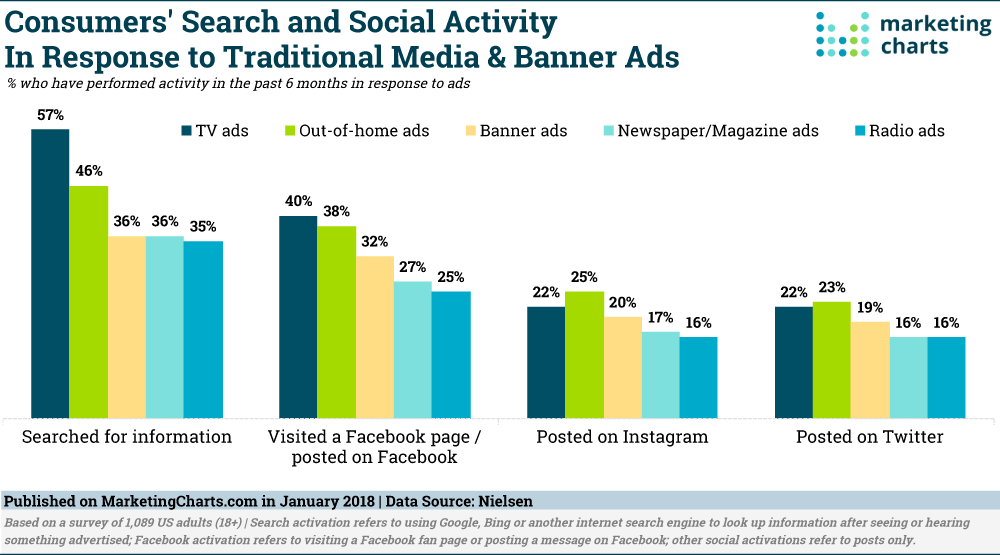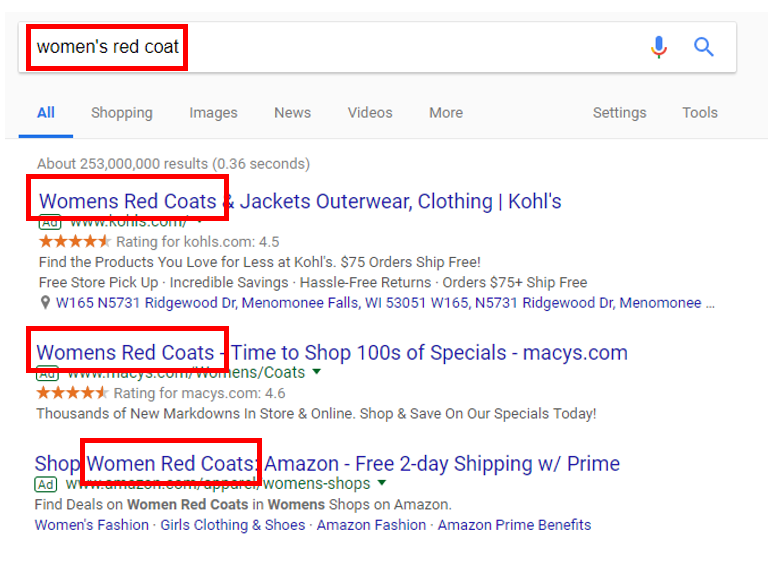Today more than ever, the customer journey is in the hands of the consumer.
While the sales process still starts with good branding, it certainly doesn’t end there. With a wealth of online reviews and social proof at their fingertips, consumers are more likely than ever to research a product before considering a purchase.
So where do they turn?
According to Nielsen’s 2017 “Ads Driving Online Activity” study, the majority of adults (57%) have used a search engine to look up product information in response to an ad they’ve seen on TV. This is a pattern seen across all media – with more than 1/3 of adults utilizing search after seeing or hearing a print, out-of-home, banner or radio ad.

Source: MarketCharts.com & Nielsen “Ads Driving Online Activity” Report
As always, it’s vital that marketers be present at every engagement point along the customer journey. And if PPC is just a forgotten line item at the bottom of your media plan or (gasp) you leave it off entirely, you’re missing an extremely important touchpoint – search.
Here are 5 reasons that paid search needs to be a key component of your media plan:
1. Support Traditional Branding Efforts
You’re investing serious funds into traditional media efforts to build your brand, so it’s important to follow your audience as they continue along the customer journey. Many consumers will turn to their favorite search engine to learn more about your products and services – you want to make sure your message is front and center when they do.
Paid search ads on Google, Bing, Yahoo and other search engines can reinforce your brand by making sure you’re at the top of the search results as they seek to learn more about your product.
2. Prevent Competitors From Capitalizing on Your Branding Efforts
You’ve worked hard to build awareness of your brand name and generate increased search traffic. Don’t let your competitors benefit from these efforts by paying for a better position on your brand terms.
A quick search of your brand name on Google will show whether any competitors are bidding on your branded keywords. By competing in paid search, you can ensure you continue to appear at the top of the search results.
3. Maximize Message Relevance
Paid search allows you to tailor ad copy and landing pages for each targeted keyword. This maximizes ad relevance and improves the user experience – giving the customer exactly what they’re looking for while nurturing them along the purchase path.
Tailored ad messaging will also improve the quality of your ad traffic by ensuring greater relevancy and providing additional product details, which in turn can help improve your ROI.
4. Change Messaging in Real Time
To further maximize relevancy, paid search offers a number of tools that allow you to tailor messaging for each individual query and user.
Remarketing list for search ads (RLSA) allow you to customize ad copy for users who have visited your site in the past. This can be useful if you want to provide a more compelling offer to these users and provide extra incentive to return and convert.
Dynamic keyword insertion (DKI) allows you to customize an ad to fit a user’s exact search query, as with “women’s red coat” in the example below. This makes it more likely that they will click on your ad, because it reflects what they were searching.

5. More Flexibility than Traditional Media
As marketers, our goals and priorities are constantly shifting. This can be a challenge when you have a change in priority midway through a carefully planned media buy.
Paid search isn’t bought upfront like other media. You only pay after someone actually clicks on your ad – and you have the ability to change or pause campaigns at any time.
This means that you’re not regulated to your original structure or keyword mix. Rather, you can realign budget immediately and in real time to focus on new priority segments, the highest ROI queries, or other changing goals.
Make paid search a key component of your media plan so you don’t miss out on the opportunity to reinforce your brand with flexible and tailored search ads.



















